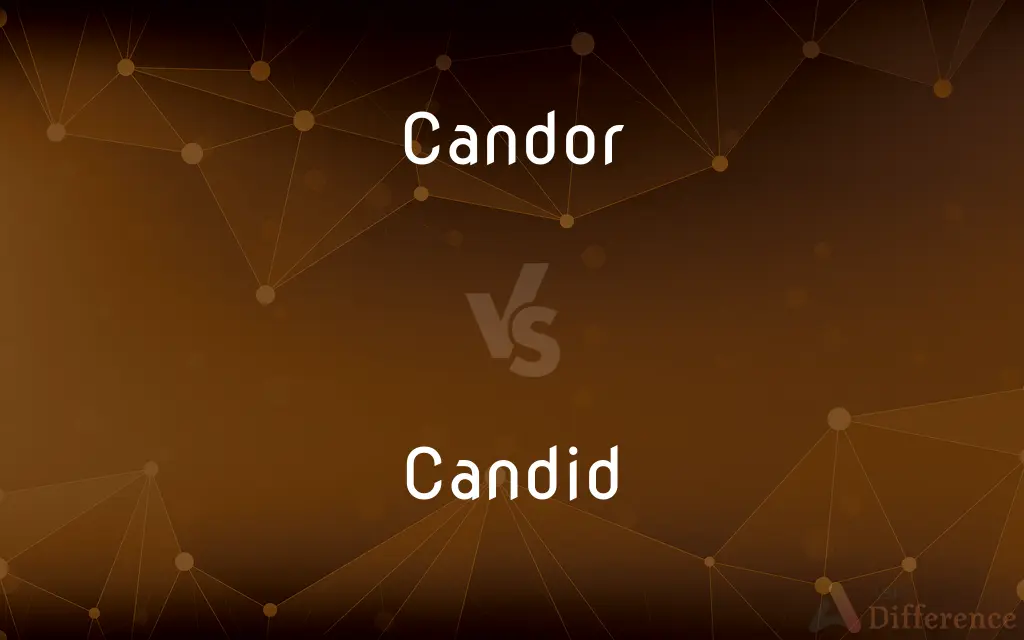Candor vs. Candid — What's the Difference?
Edited by Tayyaba Rehman — By Fiza Rafique — Updated on September 27, 2023
Candor is the quality of being open and sincere in expression, while Candid refers to being truthful and straightforward in speech or demeanor.

Difference Between Candor and Candid
Table of Contents
ADVERTISEMENT
Key Differences
Candor and Candid, though originating from the same Latin root, have distinct applications in the English language. Candor is a noun that embodies the essence of open-hearted honesty. It is used to denote frankness or the absence of deceit. On the other hand, Candid is an adjective. When someone is described as being Candid, it means they express their thoughts and feelings without reservation or disguise.
When we praise someone's Candor, we're lauding their ability to communicate without any sugarcoating, evasiveness, or ulterior motives. Conversely, when we describe a photograph as Candid, we're speaking of its unposed, spontaneous nature. This gives a hint to the versatile application of Candid, extending beyond personal characteristics to describe unplanned moments captured in media.
Further, the concept of Candor might be viewed as an ethical or virtuous trait, suggesting an internal quality or character. Candid, in its adjective form, characterizes the external expressions or manifestations of that internal quality.
Additionally, while Candor is often appreciated for its moral high ground, being too Candid can sometimes be seen as blunt or tactless. The discernment between appreciating Candor and critiquing undue Candidness is context-dependent and rests in the nuances of communication.
Comparison Chart
Part of Speech
Noun
Adjective
ADVERTISEMENT
Meaning
Openness and honesty in expression
Truthful, straightforward in speech or demeanor
Used in Context
Trait or quality
Descriptive of behavior or expression
Derived From
Latin "candor" (whiteness, purity)
Latin "candidus" (white, pure, sincere)
Examples of Use
Praising a trait
Describing a behavior or a spontaneous photograph
Compare with Definitions
Candor
Freedom from bias or malice.
His candor was evident when he openly discussed both pros and cons.
Candid
Free from reservation or disguise.
His candid nature sometimes got him into trouble.
Candor
The state of being unreserved in communication.
His candor in admitting his error earned him respect.
Candid
Honest, especially about something difficult or painful.
She was candid about her past mistakes.
Candor
Openness in expressing oneself.
He spoke about his mistakes with remarkable candor.
Candid
Not biased; fair.
The manager provided a candid evaluation of his performance.
Candor
The trait of being sincere.
People appreciated the candor with which she shared her experiences.
Candid
Unposed or spontaneous.
She took a candid photo of the kids playing.
Candor
Frankness or directness in speech or expression.
Her candor during the interview was refreshing.
Candid
Characterized by openness and sincerity of expression; unreservedly straightforward
In private, I gave them my candid opinion. ].
Candor
Frankness or sincerity of expression; openness.
Candid
Impartial and free from prejudice.
Candor
Freedom from prejudice; impartiality.
Candid
Straightforward, open and sincere.
Candor
(obsolete) Whiteness; brilliance; purity.
Candid
Not posed or rehearsed.
Candor
The state of being sincere and open in speech; honesty in expression.
Candid
A spontaneous or unposed photograph.
His portraits looked stiff and formal but his candids showed life being lived.
Candor
Impartiality.
Candid
White.
The box receives all black; but poured from thence,The stones came candid forth, the hue of innocence.
Candor
Whiteness; brightness; (as applied to moral conditions) usullied purity; innocence.
Nor yor unquestioned integrityShall e'er be sullied with one taint or spotThat may take from your innocence and candor.
Candid
Free from undue bias; disposed to think and judge according to truth and justice, or without partiality or prejudice; fair; just; impartial; as, a candid opinion.
Candor
A disposition to treat subjects with fairness; freedom from prejudice or disguise; frankness; sincerity.
Attribute superior sagacity and candor to those who held that side of the question.
Candid
Open; frank; ingenuous; outspoken.
Candor
Ability to make judgments free from discrimination or dishonesty
Candid
Characterized by directness in manner or speech; without subtlety or evasion;
Blunt talking and straight shooting
A blunt New England farmer
I gave them my candid opinion
Forthright criticism
A forthright approach to the problem
Tell me what you think--and you may just as well be frank
It is possible to be outspoken without being rude
Plainspoken and to the point
A point-blank accusation
Candor
The quality of being honest and straightforward in attitude and speech
Candid
Informal or natural; especially caught off guard or unprepared;
A candid photograph
A candid interview
Candid
Openly straightforward and direct without reserve or secretiveness;
His candid eyes
An open and trusting nature
A heart-to-heart talk
Candid
Starkly realistic;
I have never lacked candid critics in my own ranks
Candid
Truthful and straightforward.
He gave a candid response to the difficult question.
Common Curiosities
What does it mean when someone is described as Candid?
It means they are truthful and straightforward.
Is Candor a noun or an adjective?
Candor is a noun.
Which word, Candor or Candid, comes from the Latin for "whiteness or purity"?
Both derive from Latin roots relating to whiteness or purity, but "candor" directly means whiteness, purity.
Can Candid be used to describe photographs?
Yes, Candid can describe unposed, spontaneous photos.
Does Candor always suggest a positive trait?
Generally, yes. However, how it's received can depend on context.
Can Candor refer to someone's nature?
Yes, it refers to a person's quality of being open and sincere.
Are both Candor and Candid related to honesty?
Yes, both words relate to forms of honesty and straightforwardness.
Can Candid refer to an unplanned moment?
Yes, especially in contexts like Candid photography.
How do Candor and Candid differ in use?
Candor is a trait or quality, while Candid describes behavior or expression.
Would a Candid photo be planned?
No, a Candid photo typically captures an unplanned, spontaneous moment.
Is being too Candid always a good thing?
Not necessarily. Being overly Candid can sometimes be seen as blunt or tactless.
Can you appreciate someone's Candor but critique their Candidness?
Yes, depending on the context and nuances of communication.
Can someone's Candor be misinterpreted?
Yes, while honesty is appreciated, too much directness can sometimes be seen as insensitivity.
Which word is more likely to describe behavior?
Candid is more often used to describe behavior or expressions.
Is Candor more about internal quality?
Yes, it often refers to an internal trait or character of honesty.
Share Your Discovery

Previous Comparison
Newbie vs. Noob
Next Comparison
Prominent vs. OutstandingAuthor Spotlight
Written by
Fiza RafiqueFiza Rafique is a skilled content writer at AskDifference.com, where she meticulously refines and enhances written pieces. Drawing from her vast editorial expertise, Fiza ensures clarity, accuracy, and precision in every article. Passionate about language, she continually seeks to elevate the quality of content for readers worldwide.
Edited by
Tayyaba RehmanTayyaba Rehman is a distinguished writer, currently serving as a primary contributor to askdifference.com. As a researcher in semantics and etymology, Tayyaba's passion for the complexity of languages and their distinctions has found a perfect home on the platform. Tayyaba delves into the intricacies of language, distinguishing between commonly confused words and phrases, thereby providing clarity for readers worldwide.















































